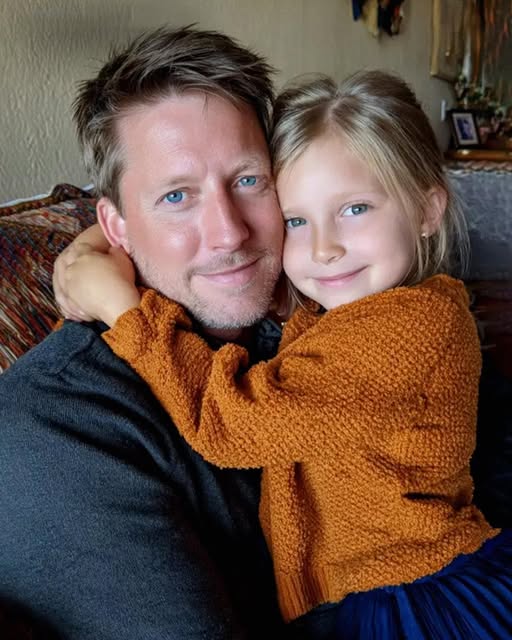I had always believed in the strength of my marriage. Not flawless—no marriage is—but steady, reliable, grounded in trust. Leo and I met eight years ago, in a time when life felt simpler and our connection was effortless. He walked into a birthday dinner carrying a homemade carrot cake, and in mere minutes, he charmed everyone at the table, including me. That was Leo: naturally thoughtful, effortlessly charming, someone who noticed the smallest details and remembered them without fanfare, as if caring was instinctive.
When our daughter Grace was born, he transformed into a father with a natural ease that left me in awe. He wasn’t just present; he was fully devoted. Pirate-voice bedtime stories, heart-shaped pancakes, tea parties with stuffed animals—Grace thought he was magic. I felt safe beside him.
I never imagined that a single phone call could shatter that sense of security.
That day had begun as any ordinary day. Leo hummed in the kitchen while carefully cutting the crusts off Grace’s peanut butter and jelly sandwich, shaping them into stars with blueberry eyes. Grace giggled at his meticulousness. He handed me her lunch and kissed my cheek, gently reminding me not to forget it in the fridge.
He planned to pick Grace up later, manage a meeting from home, and be waiting for us in the evening. Ordinary. Predictable. Comforting.
Nothing hinted at the storm waiting for us.
Just after 3 p.m., my phone rang. It was Grace. Her voice was small, shaky.
“Mommy… can you come home?”
Before I could respond, Leo’s voice thundered in the background—angry, sharp, a side of him I had never heard.
“Who are you talking to, Grace? Who?!”
She stammered, trembling. “Nobody, Daddy. I’m just playing.”
Then came the words that froze my blood:
“Don’t you dare tell your mom what you saw today. Do you understand me?”
The call ended abruptly.
I sat frozen for a moment, heart pounding. Leo had never spoken to Grace—or anyone—that way. My hands shook as I grabbed my bag, excused myself from work, and drove home, mind racing. What had my daughter witnessed?
Entering our home, everything seemed normal: sunlight spilled across the living room, a neatly folded laundry pile on the couch, a faint Disney soundtrack. Leo’s muffled voice came from what he claimed was the study. Grace sat in her bedroom, shoulders curled inward. When she saw me, her smile flickered, uncertain if she was allowed to show it.
I knelt beside her. “What happened today, sweetheart?”
She hesitated. “A lady came to see Daddy.”
“What lady?” I asked gently.
“I don’t know her. She had shiny hair and a big pink purse. Daddy gave her an envelope. Then he hugged her. It wasn’t a nice hug.”
My stomach sank.
“She told me I look like Daddy. Then she asked if I wanted a brother. But she didn’t smile nicely.”
I swallowed hard. “And after she left?”
“I called you, but Daddy got mad. I pretended I was playing with the phone and put it to Berry’s ear.” Her stuffed bear. Too clever for five.
“You didn’t do anything wrong,” I whispered, holding her close.
Later, confronting Leo in the kitchen, I demanded answers.
“Why did you yell at Grace? And what was she not supposed to tell me?”
His hesitation spoke volumes. I pressed, my voice leaving no room for lies. “If you don’t start talking now, Grace and I leave tonight.”
The truth spilled in fragments. Years ago, Leo had been with a woman named Leslie. They broke up badly. Months later, she returned pregnant, claiming the child was his. Their relationship had been toxic; when he met me, Leo panicked and offered Leslie money to keep things private. Support, he insisted—not hush money. She agreed. The child grew up with Leslie’s new husband, who legally adopted him. Leo had not seen his son since—but had secretly sent money for seven years.
That envelope? Another payment. That hug? Gratitude, he admitted.
I insisted on meeting Leslie directly. Two days later, she arrived, wary but honest. Yes, the child was Leo’s. Yes, she had kept it secret. No, she hadn’t rekindled a relationship with Leo—she had simply needed financial support.
Leo surprised us both by expressing a genuine desire to know his son, to step up fully and legally as a father. The weeks that followed were messy: legal hearings, difficult conversations, emotional fallout. Leslie’s husband and the child, Ben, learned the truth. Grace processed her own feelings, sometimes silently, sometimes through questions that lingered long into the night.
Finally, visitation was granted. Supervised meetings turned into genuine time together. Watching Leo play baseball with Ben, I realized that space for forgiveness was opening—not yet complete, but possible.
One morning, I sat across from Leo. “I’ll stay,” I said. “But this is a restart. Not a rewind.”
He nodded, sincere, exhausted. “No more secrets.”
For the first time in weeks, I believed him—not the man he had been, but the man willing to become the father and partner we needed.
